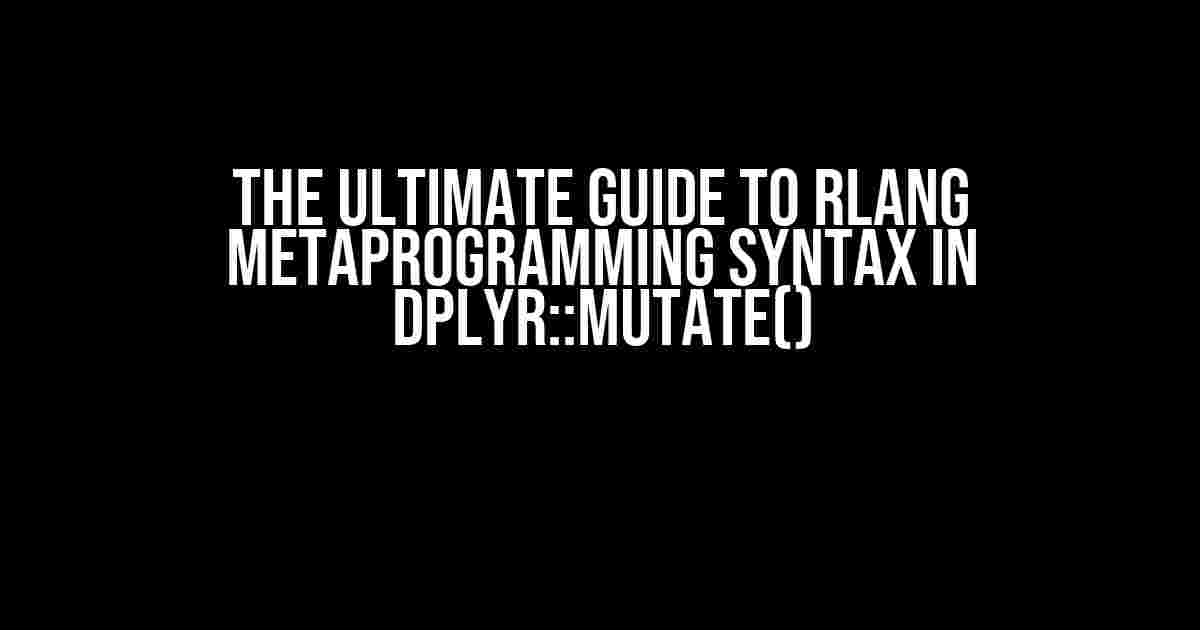Are you tired of wrestling with the syntax of rlang metaprogramming in the dplyr::mutate() function? Do you find yourself scratching your head, wondering what’s the recommended way to use assignment operators on both sides of an expression? Fear not, dear R enthusiast! In this comprehensive guide, we’ll delve into the world of rlang metaprogramming and uncover the secrets of using it effectively with dplyr::mutate().
What is Rlang Metaprogramming?
Rlang metaprogramming is a powerful tool that allows you to manipulate and evaluate R code as data. It’s a fundamental concept in the R programming language, and it’s essential for building robust and flexible data analysis pipelines. In the context of dplyr::mutate(), metaprogramming enables you to create dynamic expressions that can be evaluated at runtime.
The Problem with dplyr::mutate()
dplyr::mutate() is an incredibly useful function for modifying existing columns in a data frame or creating new ones. However, when it comes to using assignment operators on both sides of an expression, things can get tricky. You might find yourself wondering:
- How do I use the !! operator?
- What’s the difference between {{ }} and !!?
- Can I use the := operator with rlang metaprogramming?
Fear not, dear reader! We’ll answer these questions and more in the following sections.
Understanding the !! Operator
The !! operator, also known as the “bang-bang” operator, is a fundamental part of rlang metaprogramming. It’s used to “unquote” a value, allowing it to be evaluated as R code. In the context of dplyr::mutate(), !! is used to inject values into an expression.
library(dplyr)
library(rlang)
df <- tibble(x = 1:5)
df %>%
mutate(y = !!sym("x") * 2)
# A tibble: 5 x 2
x y
<int> <dbl>
1 1 2
2 2 4
3 3 6
4 4 8
5 5 10
In this example, !!sym(“x”) injects the value of x into the expression, which is then multiplied by 2.
The Difference Between {{ }} and !!
{{ }} and !! are both used in rlang metaprogramming, but they serve different purposes.
- {{ }} is used to capture expressions as quosures, which can be evaluated later.
- !! is used to unquote a value, allowing it to be evaluated as R code.
expr_a <- quo(x * 2)
expr_b <- expr_a %>% quo()
df %>%
mutate(y = !!expr_b)
In this example, expr_a is a quosure that captures the expression x * 2. expr_b is another quosure that wraps expr_a. Finally, !!expr_b unquotes the value of expr_b, allowing it to be evaluated as R code.
Using the := Operator with Rlang Metaprogramming
The := operator is a shorthand way of creating a new column in a data frame. When used with rlang metaprogramming, it allows you to create dynamic column names.
col_name <- "new_column"
df %>%
mutate(!!sym(col_name) := x * 2)
In this example, !!sym(col_name) creates a dynamic column name based on the value of col_name. The := operator then assigns the result of x * 2 to that column.
Best Practices for Rlang Metaprogramming in dplyr::mutate()
Here are some best practices to keep in mind when using rlang metaprogramming with dplyr::mutate():
- Use {{ }} to capture expressions as quosures.
- Use !! to unquote values and inject them into expressions.
- Avoid using := with !!, as it can lead to confusion and errors.
- Use sym() to create symbols from character vectors.
- Test your expressions thoroughly to ensure they’re evaluating correctly.
Common Pitfalls to Avoid
When working with rlang metaprogramming in dplyr::mutate(), it’s easy to fall into some common pitfalls. Here are a few to watch out for:
- Forgetting to use !! to unquote values.
- Using := with !!, which can lead to errors.
- Not capturing expressions as quosures using {{ }}.
- Not testing expressions thoroughly.
Conclusion
Rlang metaprogramming is a powerful tool that can be intimidating at first, but with practice and patience, you’ll become a master of dynamic expressions. By following the best practices and avoiding common pitfalls outlined in this guide, you’ll be well on your way to creating robust and flexible data analysis pipelines with dplyr::mutate().
| Operator | Description |
|---|---|
| !! | Unquotes a value, allowing it to be evaluated as R code. |
| {{ }} | Captures an expression as a quosure, which can be evaluated later. |
| := | Assigns a value to a column in a data frame. |
| sym() | Creates a symbol from a character vector. |
With this comprehensive guide, you’ll be well-equipped to tackle even the most complex metaprogramming tasks in dplyr::mutate(). Remember to practice regularly and experiment with different expressions to solidify your understanding of rlang metaprogramming.
Additional Resources
If you’re hungry for more information on rlang metaprogramming and dplyr::mutate(), be sure to check out these additional resources:
- The official rlang documentation: https://rlang.r-lib.org
- The dplyr::mutate() documentation: https://dplyr.tidyverse.org/reference/mutate.html
- A tutorial on metaprogramming in R: https://www.datacamp.com/community/tutorials/r-metaprogramming
Happy coding, and may the syntax be ever in your favor!
Frequently Asked Question
Unravel the mysteries of rlang metaprogramming syntax in dplyr’s mutate() function!
What is the recommended rlang metaprogramming syntax to use on the left side of an assignment operator in the dplyr::mutate() function?
The recommended syntax for the left side is to use the {{ }} operator, also known as the “curly-curly” operator. This operator injects the expression inside it into the surrounded code, allowing you to use dynamic column names.
What about the right side of the assignment operator in the dplyr::mutate() function?
For the right side, use the !! operator, also known as the “bang-bang” operator. This operator unquotes the expression inside it, allowing you to inject dynamic values into the computation.
Can I use the !! operator on the left side of the assignment operator?
No, you should not use the !! operator on the left side. The !! operator is meant for unquoting values, not for creating dynamic column names. Use the {{ }} operator for dynamic column names on the left side.
What if I want to perform calculations using dynamic column names on the right side of the assignment operator?
In that case, use the {{ }} operator on the right side as well. This will allow you to inject dynamic column names into the computation. However, be mindful of the context and ensure that the column names are properly sanitized to avoid any potential security issues.
Are there any best practices to keep in mind when using rlang metaprogramming syntax in dplyr::mutate()?
Yes, always keep in mind the separation of concerns between data and code. Use rlang metaprogramming syntax only when necessary, and strive to keep your code readable and maintainable. Additionally, thoroughly test your code to ensure it works as intended, especially when working with dynamic column names and values.


